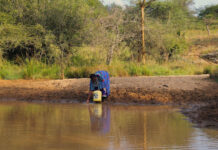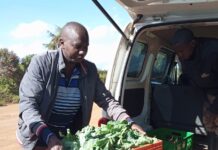By Jane Meza
Kenya: African delegates and climate activists left COP29 frustrated as the proposed climate finance goal of $250 billion annually by 2035 fell far short of the $1.3 trillion they had demanded. The figure, they said, fails to address the escalating climate crisis in vulnerable regions like Africa.
On Finance Day, activists held a 10-meter-long “giant climate invoice” calling for trillions in public funding to cover loss and damage, adaptation, and mitigation. Groups like ActionAid, CAN, and Greenpeace Africa urged Global North nations to acknowledge their responsibility and act.
Mohamed Adow, Director of Power Shift Africa, described the proposal as an insult, “This is a slap in the face developed countries must provide figures that match the needs of the developing world.” Claimed Adow.
African negotiators pointed out that while the $250 billion doubles the current $100 billion annual goal, it is just a fraction of the $5–6.8 trillion needed annually to combat climate change globally and the continent alone requires $215–$387 billion for adaptation and up to $894 billion for loss and damage each year.

For African nations such as Kenya and Uganda, the NCQG’s proposed $250 billion was a stark reminder of the gap between rhetoric and action. Mohamed Adow, director of Power Shift Africa, criticized the proposal, stating.
“Our expectations were low, but this is a slap in the face, developed countries must own up to their responsibilities and provide a figure that matches the needs of the developing world.” Stated Adow.
Environmental activist Fred Njehu of Greenpeace Africa also voiced disappointment, calling the NCQG draft a missed opportunity to hold polluters accountable. While the text acknowledged systemic barriers to accessing finance and the need for grants, activists argued it failed to introduce enforceable mechanisms or prioritize non-debt-inducing funding.
Harjeet Singh, Global Engagement Director at the Fossil Fuel Non-Proliferation Treaty, condemned the reliance on loans mobilized through multilateral development banks. He said:
“Developed countries are offering paltry sums and more loans, ignoring the urgent need for grants to address the severe impacts of climate change in vulnerable nations.”
Delegates and activists from Africa shared harrowing accounts of the climate crisis already affecting their communities. Sylvia Kijangwa, a youth climate activist from Tanzania, highlighted how women and young girls are increasingly forced to walk long distances for water, risking attacks and abuse.
“Our children are suffering from malnutrition due to food shortages, while developed nations continue to make empty promises. This Finance Day, we demand justice for the women and children of Africa who bear the brunt of a crisis they did not cause.” Said Ms Sylvia.
Nura Mohamed, Program Manager at ActionAid Somaliland, underscored the gendered impact of climate shocks
“Women and girls in Somaliland cannot wait any longer as major polluters continue to evade accountability for the climate debts owed to communities devastated by climate change. For women and girls, the impacts are severe – droughts endanger livelihoods, and the resulting economic hardships fuel surges in gender-based violence and FGM/C, said Nura.
The final NCQG proposal, despite doubling the current $100 billion annual goal, still represented a fraction of the $5–6.8 trillion needed annually until 2030 to address climate impacts globally. African negotiators stressed that the adaptation finance gap alone demands $215–$387 billion per year, while loss and damage could require up to $894 billion annually.
Namrata Chowdhary, Chief of Public Engagement at 350.org, called the draft a betrayal, saying Every dollar less than $1.3 trillion is a betrayal of the Global South all ambition discussed earlier in COP29 disappeared.
Greenpeace Africa acknowledged positive elements in the text, such as the recognition of systemic barriers and the principle of “polluter pays.” However, Dr. Lamfu Yengong, Forest Campaigner at Greenpeace Africa, warned.
“Without clear targets and mechanisms, the adaptation finance gap will continue to grow, leaving African communities more vulnerable.” Claimed Dr. Lamfu.
Civil society leaders and African delegates called for solidarity among Global South nations to reject the NCQG text unless meaningful revisions are made. Gerry Arances, Executive Director of the Centre for Energy, Ecology, and Development, declared.
“If the Global North refuses to take their historic responsibilities seriously, we must leverage our collective economic power to demand equitable solutions for the planet.”
As COP29 concluded, African delegates vowed to continue pushing for bold climate finance commitments that address the urgent needs of vulnerable communities. The summit’s outcomes underscored the growing divide between the promises of developed nations and the realities faced by those on the frontlines of the climate crisis.
The rallying cry of the summit, “Polluters, pay up!” remains a powerful reminder of the justice that millions in the Global South continue to demand.














